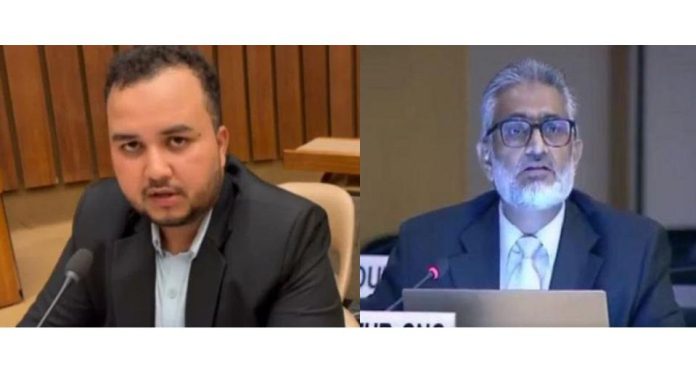In a powerful and heartfelt address to the 54th regular session of the United Nations Human Rights Council (UNHRC), Professor Sajjad Raja brought forth the plight of the people living in Pakistan-Occupied Jammu and Kashmir (POJK). Along with him, Danish Ali a human rights activist from Pakistan-occupied-Gilgit Baltistan(POGB) also spoke up and exposed Pakistan Army’s human rights crimes in the occupied region. His words resonated with a passion that sought not just attention but, more importantly, action from the international community.
Plight of POJK
Professor Sajjad Raja is the Chairman National Equality Party, JKGBL, that stands for Jammu and Kashmir Globalization Board of Leaders. It is a political party in Pakistan-occupied Kashmir (POJK) that advocates for the rights of the people of POJK and POGB. His intervention at the UNHRC session shed light on the grim circumstances faced by the people of POJK, who have long yearned for a life of peace and dignity on their own land. His concerns centered around two critical issues: the availability of essential resources like flour and electricity and the pressing need to free the region from Pakistan Army’s oppressive grip.
The professor appealed to the global community and reminded us of the decades-long struggle of those living in POJK. Their aspirations for freedom and self-determination have been consistently denied with the use of utmost violence. And their basic human rights have been violated. This situation calls for immediate attention and intervention, and Professor Raja’s impassioned plea came at a critical time. Pakistan is grappling with inflation, debt and instability. These economic hardships has now been transferred to the innocent civilians, and the burden of high electricity rates and food has led to numerous protests, burning of the electricity bills in the region.
Pakistan’s Human Rights violations in POGB
The voice of Danish Ali also reverberated through the UNHRC chambers as he brought to light the coercive measures employed by Pakistan Army to suppress human rights in the region. Pakistan-occupied-Gilgit-Baltistan has, for far too long, suffered under the shadow of political and military control, with the local population’s basic rights going unfulfilled.
Ali spoke about the Paki establishment’s suppression of freedom of expression of POGB. He also highlighted the deprivation of basic human rights and amenities, including medical and educational facilities, under Pakistan’s illegal occupation. Pak Army also restricts internet services to cut the region off and isolating it from the rest of the world.
Furthermore, people of POGB are suffering due to Pakistan’s anti-people model of control, and lack of any form of governance. Pak has imposed excessive tax on the electricity bills on POGB and it has forced the people to launch a civil disobedience movement. Also, currently Shia minorities are being targeted through misuse of blasphemy law. These issues has resulted in protests in the region.
Minorities in Pakistan especially Shias, Ahmadiyas, Christians and Hindus are living under constant threat of cultural and physical genocide. Therefore, Ali urged the international community to support POGB & POJK to reunite with India & end to Pak illegal occupation.
Demand for Justice
The people of POGB and POJK are now taking a stand, raising their voices to demand justice and basic rights. They are no longer willing to accept a status quo that has deprived them of the resources and freedoms they rightfully deserve. Their peaceful protests show the urgency of the situation and the need for international platforms to step in and address their grievances.
Fatima Shigri, another brave voice from POGB, has questioned Pakistan’s priorities. In her poignant words, she asks why the suffering of the people in her region goes unnoticed, while trivial matters make headlines. Her question resonates with many who feel that their lives and struggles have been overshadowed by the politics of Pakistan.
A Global Call for Attention and Action
The people of POGB & POJK are standing up for their rights and their land. Their demand for justice is clear, and their commitment to bringing about change is unwavering. They understand that their land and resources are only what Pakistan wants, but they are determined to reclaim what is rightfully theirs.
In a world where headlines are often dominated by global politics and power struggles, it is essential to pay attention to the voices that often go unheard. Professor Sajjad Raja, Danish Ali, and Fatima Shigri, along with countless others in POJK and POGB, have now raised their voices for themselves. Their passionate pleas at the United Nations should serve as a wake-up call to the international community.

